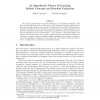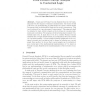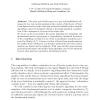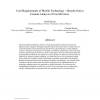76 search results - page 4 / 16 » Consequence analysis theory for alarm analysis |
FOCS
1999
IEEE
13 years 11 months ago
1999
IEEE
We study the phenomenon of cognitive learning from an algorithmic standpoint. How does the brain effectively learn concepts from a small number of examples despite the fact that e...
TVCG
2010
13 years 5 months ago
2010
—Crease surfaces are two-dimensional manifolds along which a scalar field assumes a local maximum (ridge) or a local minimum (valley) in a constrained space. Unlike isosurfaces, ...
FCA
2005
Springer
14 years 1 months ago
2005
Springer
Abstract. A main goal of Formal Concept Analysis from its very beginning has been the support of rational communication. The source of this goal lies in our understanding of mathem...
ECCV
1998
Springer
14 years 9 months ago
1998
Springer
Abstract. The main goal of this paper is to put well-established techniques for two-view motion analysis in the context of the theory of Total Least Squares and to make clear that ...
ISEM
2008
13 years 7 months ago
2008
Advanced mobile technology continues to shape professional environments. Smart cell phones, pocket computers and laptop computers reduce the need of users to remain close to a wir...




